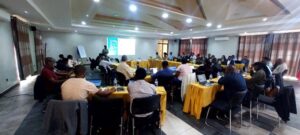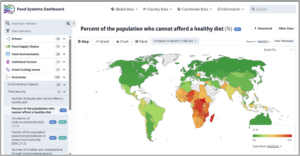Rwanda’s agrifood system is identified as an interconnected ecosystem of actors and activities extend across various food system’s stages, from production, processing, distribution, consumption, to waste management. It is central to the country’s structural transformation driving food and nutrition security, livelihood improvement, and sustainable economic growth. Current data indicate that the AFS makes up nearly two-fifths of GDP and accounted for more than 60% of total employment in 2022 (Xinshen Diao et al, 2025).
The availability of reliable, harmonized, and accessible food systems data covering agriculture, nutrition, markets, environment, health, and livelihoods are essential for integrated planning and evidence-based policymaking. The need for harmonized data aligns with continental and national frameworks, including the 2025 Kampala CAADP Declaration on Building Resilient Agrifood Systems in Africa, the Sustainable Development Goals (SDGs), the National Strategy for Transformation (NST2), and the Strategic Plan for Agriculture Transformation (PSTA 5). These frameworks emphasize data-driven accountability to demonstrate progress, identify gaps, and guide resource allocation.
It's in this context that the Ministry of Agriculture and Animal Resources (MINAGRI) in collaboration with the International Food Policy Research Institute (IFPRI) and other key partners convened a five-day national workshop in Musanze (from 06 to 10 October, 2025) to develop a coordinated framework for harmonizing agricultural and food systems statistics.
 In her opening remarks, Dr. Chantal Ingabire, the Director General of Planning in the Ministry of Agriculture and Animal Resources, emphasized the importance of adopting a systems-thinking approach in the transformation of Rwanda’s agrifood systems. She outlined the Strategic Plan for Agriculture Transformation (PSTA 5) as the central policy framework guiding this transformation which aims to modernize Rwanda’s agriculture by increasing productivity, promoting value addition, expanding market access, and strengthening climate resilience. She acknowledged the progress achieved to date, particularly the establishment of the Food Systems Coordination Unit within MINAGRI, which plays a pivotal role in fostering cross-sector collaboration. Dr. Chantal also underscored the need for greater inclusion of the private sector and non-governmental organizations (NGOs), recognizing their critical roles in investment, innovation, and service delivery. The goal
In her opening remarks, Dr. Chantal Ingabire, the Director General of Planning in the Ministry of Agriculture and Animal Resources, emphasized the importance of adopting a systems-thinking approach in the transformation of Rwanda’s agrifood systems. She outlined the Strategic Plan for Agriculture Transformation (PSTA 5) as the central policy framework guiding this transformation which aims to modernize Rwanda’s agriculture by increasing productivity, promoting value addition, expanding market access, and strengthening climate resilience. She acknowledged the progress achieved to date, particularly the establishment of the Food Systems Coordination Unit within MINAGRI, which plays a pivotal role in fostering cross-sector collaboration. Dr. Chantal also underscored the need for greater inclusion of the private sector and non-governmental organizations (NGOs), recognizing their critical roles in investment, innovation, and service delivery. The goal
Dr. James Warner, Program Leader for IFPRI’s Rwanda Strategy Support Program, further emphasized the importance of CAADP implementation in Rwanda and its alignment with national agrifood system priorities. He explained that the CAADP Kampala Declaration (2026–2035) which marks a renewed continental commitment to transform Africa’s agrifood systems into engines of inclusive and climate-resilient growth. he called for greater alignment of Rwanda’s indicators with the CAADP monitoring framework to ensure consistency in tracking progress and mobilizing resources. He underscored the importance of quantifying emerging priorities such as climate change resilience, noting that while “climate change” is referenced nearly 40 times in PSTA 5, it remains insufficiently measured. He concluded by reaffirming IFPRI’s support to build national capacity for food systems data collection, analysis, and reporting, enabling Rwanda to generate timely evidence that informs investment decisions and strengthens accountability in achieving both national and continental agricultural goals.
Aligning together, the contributions from Dr. Chantal and Dr. James reinforced a shared vision: that data harmonization is the foundation of effective food systems’ governance. By aligning indicators, strengthening reporting systems, and integrating cross-sector data, Rwanda is building the institutional infrastructure necessary to transform its agrifood systems.

 Adding to the discussion, a representative from the Global Food Systems Dashboard team highlighted ongoing efforts to strengthen data integration and governance within Rwanda’s agrifood system. The ongoing initiative presents data from multiple, diverse sources into simple, visually appealing graphics which will allow stakeholders to set priorities for action and track progress and see if policies or other interventions in place are meeting their goals. She emphasized that the dashboard is working hard to harmonize international and national data sources, ensuring that Rwanda’s food systems reporting reflects both global standards and locally generated evidence for more informed decision-making.
Adding to the discussion, a representative from the Global Food Systems Dashboard team highlighted ongoing efforts to strengthen data integration and governance within Rwanda’s agrifood system. The ongoing initiative presents data from multiple, diverse sources into simple, visually appealing graphics which will allow stakeholders to set priorities for action and track progress and see if policies or other interventions in place are meeting their goals. She emphasized that the dashboard is working hard to harmonize international and national data sources, ensuring that Rwanda’s food systems reporting reflects both global standards and locally generated evidence for more informed decision-making.
The workshop featured several interactive sessions concerning the design of new food system indicators to be used for inputs into a comprehensive dashboard, facilitated by Dr. Sirikare Sylvere, the Agri-food systems coordinator, who organized five different teams by thematic coherence and alignment to PSTA5 outputs. During the group discussions each group was requested identify key indicators for dashboard development and reporting consistency, justifying their selection based on relevance and measurability.
This workshop marked an important step toward ensuring that national planning and policy decisions are guided by accurate, timely, and harmonized evidence, advancing both national and continental commitments toward resilient and inclusive agrifood systems.
Authors:
Serge Mugabo - Senior Research Associate, Rwanda Strategy Support Program, Development Strategies and Governance, IFPRI.
Dr. James Warner, Program Leader for IFPRI’s Rwanda Strategy Support Program, Development Strategies and Governance.
Leave a Reply